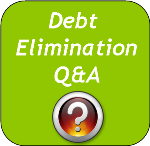 So you have finally decided to take action and you are getting out of debt. Congratulations! You are on your way to financial freedom! Debt is the disease that slowly kills your ability to win with money. It is very hard to prosper with your money when you are weighed down by a big debt burden.
So you have finally decided to take action and you are getting out of debt. Congratulations! You are on your way to financial freedom! Debt is the disease that slowly kills your ability to win with money. It is very hard to prosper with your money when you are weighed down by a big debt burden.
My wife and I have been debt-free (except for our mortgage) for 5 years now and we have never looked back. As you embark on this journey here are 3 Questions for you to consider. These are questions we had to answer for ourselves so I believe these will help you as well:
1. In what order should I pay my debts?
We used the debt snowball method to pay around $50K in consumer debt. You list all of your debts smallest to largest regardless of interest rate, and you start paying extra on the smallest one. Once you get rid of that first debt, you can apply that payment amount to the next debt on the list.
While it might make sense to pay on the debt with the highest interest first, the reality is that interest rates are not your problem, the amount of debt is the problem. When we got the first taste of eliminating our smallest debts, we gained the momentum to keep going. You need a few quick victories to fuel the fire at the start of your debt-free journey.
2. Should I continue contributing to retirement while I get out of debt?
The short answer is no, because it is only a temporary situation. Still, this was one of the hardest things to do for me. The reality is that if you work for an employer that offers a matching 401K plan (or another similar plan), you will miss out on the employer match while you are getting out of of debt. However, when we did this, it brought the intensity of our debt free journey to a new level because we had an increased cash flow.
We were able to make triple payments on our car loan and when we got rid of that, we we are able to apply all that extra money to our student loan, the last debt on our list. Initially I thought we would miss on the 401K match for 1 year but we beat that date by a few months. Once I started contributing again, we got back on track and made up for the short pause.
3. Should I continue giving while I get out of debt?
I believe that giving has to be an essential component of your financial plan. My wife and I are Evangelical Christians and firmly believe in giving a tenth of our income (tithing) to our local church. So we gave our tithe during the time that it took us to get out of debt. We managed to payoff debt and build an emergency fund using 90% of our income.
Even if you are not a person of faith, you should find a way to give to a cause that’s important to you. Generosity is a distinguishing trademark of people who prosper with money.
What other questions do you have about getting out of debt? Leave a comment below and I will answer it for you!
Presione aquí para la versión de este artículo en Español.

Great information. Thank you for sharing!
Thank you Tarra!